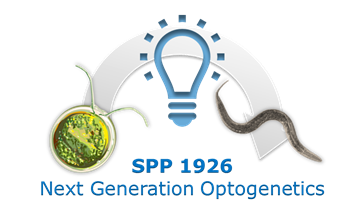Priority Programme "Next Generation Optogenetics: Tool Development and Application" (SPP1926) Overview of Submitted Proposals
Mechanism, engineering and application of Rhodopsin-guanylyl cyclases
- Baier, München
- Elstner, Karlsruhe
- Hegemann, Berlin
- Schneider, Freiburg
Optogenetic control of site-specific proteolysis and protein stability
- Essen, Marburg
- Taxis, Marburg
Optogenetic stimulation of intracellular Ca2+ release from the endoplasmatic reticulum
- Gottschalk, Frankfurt
- Lehnart, Göttingen
- Sasse, Bonn
A Bacterial Light-Activated RNA-Binding Protein as an Orthogonal Optogenetic Actuator in Eukaryotes
- Mayer, Bonn
- Möglich, Bayreuth
Constructing of genetically encoded light-activated K+-channels with fast gating and distinct trafficking properties
Photoswitchable Lipids for the Optical Control of Mechanosensitive Ion Channels
- Bondar, Berlin
- Heberle, Berlin
- Trauner, München
Tuning wavelength and G protein specificty of Melanopsin for optogenetic control of G protein signaling pathways.
- Gerwert, Bochum
- Herlitze, Bochum
Development and Application of New Optogenetic Tools Targeted to Intracellular Compartments
- Hegemann, Berlin
- Rost, Berlin
Optogenetics-assisted identification of the rapid stress receptor in zebrafish
Analyzing the physiological function of cAMP in primary cilia using optogenetics
Red-light-regulated actuators for spatiotemporal control of opsin expression and modulation of cell-cell interactions within the prefrontal circuit during impulse control
- Diester, Freiburg
- Möglich, Bayreuth
- Ruther, Freiburg
- Zurbriggen, Düsseldorf
Coordination Funds
Shedding light on myogenesis: using optogenetics to investigate myoblast differentiation and muscle regeneration
- Kassel, Karlsruhe
- Di Ventura, Heidelberg
Development of next-generation light-gated inhibitory ion channels to probe somatosensory integration in the Drosophila nociceptive circuit in vivo
- Soba, Hamburg
- Wiegert, Hamburg
